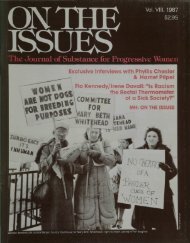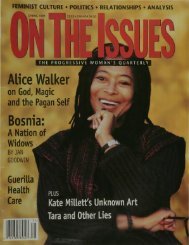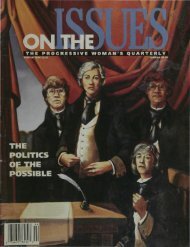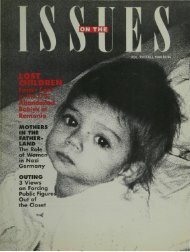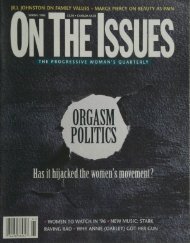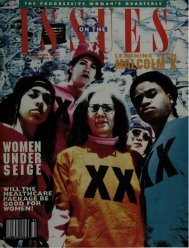300 Years & Counting 1H KILLS - On The Issues Magazine
300 Years & Counting 1H KILLS - On The Issues Magazine
300 Years & Counting 1H KILLS - On The Issues Magazine
You also want an ePaper? Increase the reach of your titles
YUMPU automatically turns print PDFs into web optimized ePapers that Google loves.
<strong>The</strong> following year, Joe McCarthy died, formallyending the dismal and infamous decadethat took his name.Nearly 40 years have passed, but the emotionallegacy of those days remains deeplyembedded in my psyche and the psyches ofeveryone I have ever known who was a kidfrom a left-wing family in those days. And thelegacy is powerful.<strong>On</strong> the positive side is the pride in a politicaltradition that stands for egalitarianism, therights of minorities, economic justice and civilliberties. But we are also a subculture thatwill always feel vulnerable to the powers thatbe. We will always believe that we are irrevocablyoutsiders; we often wonder when thegovernment will, once again, need politicalscapegoats and choose us. As a consequence,we have very little faith in, or regard for, dulyconstituted authority. We also know thatfriends are often friends only to a point. I'msure many of us wonder from time to time —as I do — whom among our good friends wecan really trust; which of them, if pressed,would point a finger at us to save their ownskins as, for example, choreographer JeromeRobbins, director Elia Kazan, actors Lee J.Cobb (who even named his ex-wife), JoseFerrer and Lloyd Bridges, and playwrightClifford Odets (to name a few famous ones) alldid before the Un-American Activities Committee.<strong>On</strong>e of the most central and sobering lessonsof my youth occurred in the early 1950s andwas the result of my uncle Archie's CommunistParty membership. It was my first andmost dramatic experience of being an outsider.<strong>On</strong>e afternoon, when I was about 13 andthe McCarthy era was at full tilt, I was calledinto our living room by my father. Archie wasabout to "disappear," he told me; in fact, hewas probably gone already. "What do youmean 'disappear'?" I asked. "<strong>The</strong> Party haschosen some leaders to stand trial and go tojail, and others to stay free. But they have togo underground so they won't be arrested,"was my father's reply. "Where's he going?""<strong>The</strong>re's an old revolutionary principle," myfather said quietly, "that you should neverknow more than you have to about what yourfellow revolutionaries are doing. If they arrestyou and torture you, you can't betray anyonebecause you can't tell what you don't know.It's better that way. I don't want to knoweither." Few conversations have impressedme more.That night, as my father predicted, the FBIshowed up. <strong>The</strong>re were two agents, in fedorasno less, sitting in a pale blue car parked infront of the house. "<strong>The</strong>y'll be tapping theON THE ISSUES SUMMER 1992Janet Ades •arguing with herfather near the endol his life."<strong>The</strong>y'll betapping thephone," saidmy father, "sodon't use it todiscuss anyonein the family,and be carefulof neighbors nphone," said my father, "so don't use it todiscuss anyone in the family, and be careful ofneighbors who ask too many questions becausethe FBI has probably found stoogesamong them." Even at the rebellious age of 13,I knew enough to listen well and do as he said.Such conversations were universal amongparents and children of the left in those days.We all recall the gratuituous harassment, sofrightening to a child, of strange, unfriendlymen in dark suits ringing the bell and askingto speak to our parents, tailing family mem-bers, sometimes even us, bugging our phonesand making spies of our neighbors. <strong>On</strong>e of myfriends remembers an awful night when theFBI shone a powerful beam of light throughthe windows of her house, and with it scouredevery piece of furniture, the floors, and wallsof every room that wasn't curtained. "Eventhe ceilings," she later said indignantly."Maybe they thought we had the atom bombsecret hidden in the chandelier?"<strong>The</strong> biggest fear, though, was whether yourfather would lose his job. My father, RichardLynden, was an elected official of the InternationalLongshoremen's and Warehousemen'sUnion, the small, independent, politically radicalunion founded, and for many years led, byHarry Bridges. His job was safe, but that wasnot enough to make us feel secure—even if weput up a pretty good front.<strong>The</strong> night the FBI came to camp in front ofour house, my father grandly announced thathe was taking us all to dinner at Amelio's,then one of San Francisco's finest restaurants.He took a long, out-of-the-way routethere while my sister and I, in our finery,made faces and stuck our tongues out at thetwo agents in the car that never got more than20 feet behind us. Playfully, my father droveas though he were being elaborately courteousto two nitwits, very, very slowly to theoutskirts of the Mission district and then up alonely dirt road. At the crest of the hill, whichwas flat and just big enough for two cars, hedrove around and around and around in acircle. You couldn't tell who was followingwhom, and my father played the game for 1019



